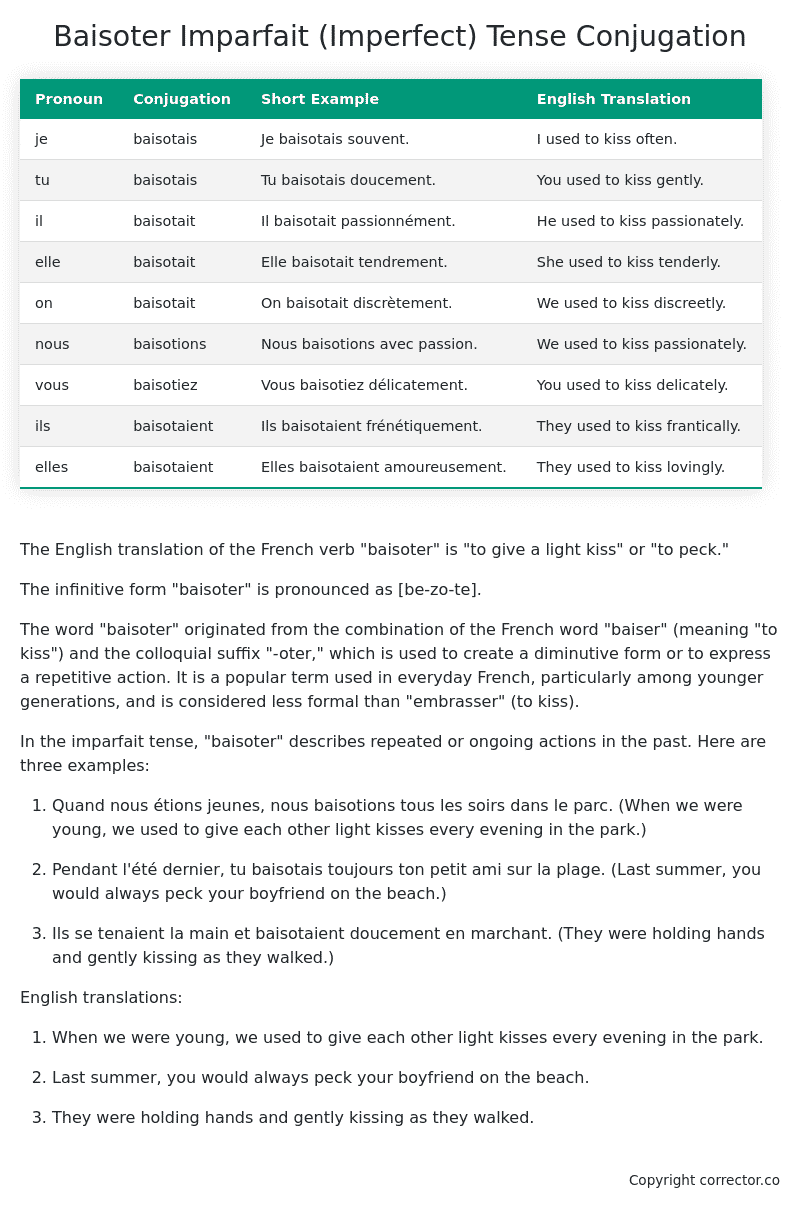Imparfait (Imperfect) Tense Conjugation of the French Verb baisoter
Introduction to the verb baisoter
The English translation of the French verb “baisoter” is “to give a light kiss” or “to peck.”
The infinitive form “baisoter” is pronounced as [be-zo-te].
The word “baisoter” originated from the combination of the French word “baiser” (meaning “to kiss”) and the colloquial suffix “-oter,” which is used to create a diminutive form or to express a repetitive action. It is a popular term used in everyday French, particularly among younger generations, and is considered less formal than “embrasser” (to kiss).
In the imparfait tense, “baisoter” describes repeated or ongoing actions in the past. Here are three examples:
-
Quand nous étions jeunes, nous baisotions tous les soirs dans le parc.
(When we were young, we used to give each other light kisses every evening in the park.) -
Pendant l’été dernier, tu baisotais toujours ton petit ami sur la plage.
(Last summer, you would always peck your boyfriend on the beach.) -
Ils se tenaient la main et baisotaient doucement en marchant.
(They were holding hands and gently kissing as they walked.)
English translations:
-
When we were young, we used to give each other light kisses every evening in the park.
-
Last summer, you would always peck your boyfriend on the beach.
-
They were holding hands and gently kissing as they walked.
Table of the Imparfait (Imperfect) Tense Conjugation of baisoter
| Pronoun | Conjugation | Short Example | English Translation |
|---|---|---|---|
| je | baisotais | Je baisotais souvent. | I used to kiss often. |
| tu | baisotais | Tu baisotais doucement. | You used to kiss gently. |
| il | baisotait | Il baisotait passionnément. | He used to kiss passionately. |
| elle | baisotait | Elle baisotait tendrement. | She used to kiss tenderly. |
| on | baisotait | On baisotait discrètement. | We used to kiss discreetly. |
| nous | baisotions | Nous baisotions avec passion. | We used to kiss passionately. |
| vous | baisotiez | Vous baisotiez délicatement. | You used to kiss delicately. |
| ils | baisotaient | Ils baisotaient frénétiquement. | They used to kiss frantically. |
| elles | baisotaient | Elles baisotaient amoureusement. | They used to kiss lovingly. |
Other Conjugations for Baisoter.
Le Present (Present Tense) Conjugation of the French Verb baisoter
Imparfait (Imperfect) Tense Conjugation of the French Verb baisoter (You’re reading it right now!)
Passé Simple (Simple Past) Tense Conjugation of the French Verb baisoter
Passé Composé (Present Perfect) Tense Conjugation of the French Verb baisoter
Futur Simple (Simple Future) Tense Conjugation of the French Verb baisoter
Futur Proche (Near Future) Tense Conjugation of the French Verb baisoter
Plus-que-parfait (Pluperfect) Tense Conjugation of the French Verb baisoter
Passé Antérieur (Past Anterior) Tense Conjugation of the French Verb baisoter
Futur Antérieur (Future Anterior) Tense Conjugation of the French Verb baisoter
Subjonctif Présent (Subjunctive Present) Tense Conjugation of the French Verb baisoter
Subjonctif Passé (Subjunctive Past) Tense Conjugation of the French Verb baisoter
Subjonctif Imparfait (Subjunctive Imperfect) Tense Conjugation of the French Verb baisoter
Subjonctif Plus-que-parfait (Subjunctive Pluperfect) Tense Conjugation of the French Verb baisoter
Conditionnel Présent (Conditional Present) Tense Conjugation of the French Verb baisoter
Conditionnel Passé (Conditional Past) Tense Conjugation of the French Verb baisoter
Conditionnel Passé II (Conditional Past II) Tense Conjugation of the French Verb baisoter
L’impératif Présent (Imperative Present) Tense Conjugation of the French Verb baisoter
L’impératif Passé (Imperative Past) Tense Conjugation of the French Verb baisoter
L’infinitif Présent (Infinitive Present) Tense Conjugation of the French Verb baisoter
L’infinitif Passé (Infinitive Past) Tense Conjugation of the French Verb baisoter
Le Participe Présent (Present Participle) Tense Conjugation of the French Verb baisoter
Le Participe Passé (Past Participle) Tense Conjugation of the French Verb baisoter
Struggling with French verbs or the language in general? Why not use our free French Grammar Checker – no registration required!
Get a FREE Download Study Sheet of this Conjugation 🔥
Simply right click the image below, click “save image” and get your free reference for the baisoter imparfait tense conjugation!

Baisoter – About the French Imparfait Tense
NOTE: To take a deep dive into all the French tenses then see our article on Mastering French Tense Conjugation.
Formation of the Imparfait Tense
For regular -er verbs:
For regular -ir verbs
For regular -re verbs
Common Everyday Usage Patterns
Description of Past Habits
Background Information
Mental and Emotional States
It’s employed to express emotions, thoughts, or physical sensations in the past. For example: “J’étais content quand il est arrivé.” (I was happy when he arrived.)
Ongoing Actions
Points to Note About the Imparfait Tense
Passé Composé vs. Imparfait
Conditional
Si Clauses
Narration
I hope you enjoyed this article on the verb baisoter. Still in a learning mood? Check out another TOTALLY random French verb imparfait conjugation!


